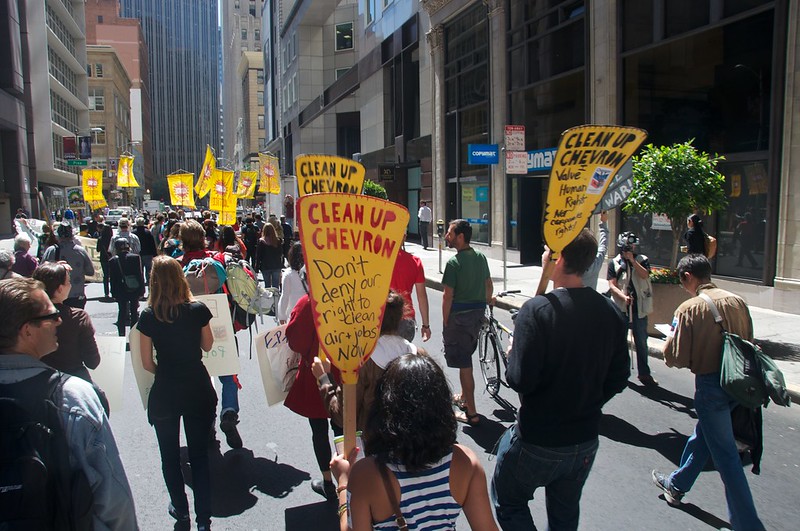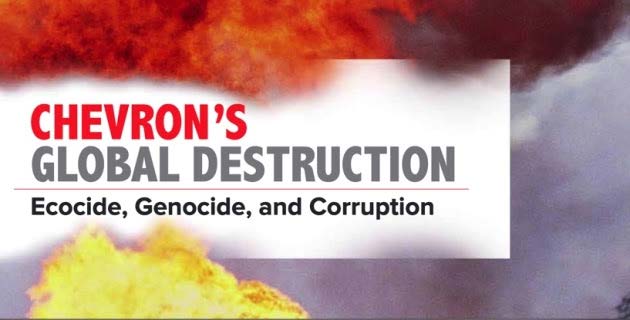In October 2021, a comprehensive expert report — Chevron’s Global Destruction: Ecocide, Genocide, and Corruption — concluded that Chevron oil has dozens of outstanding legal cases for environmental harms, and a track record of not paying the associated fines and judgments.
The report’s author, anthropologist Nan M Greer, documents how Chevron, the world’s leading producer of greenhouse gas emissions among investor-owned oil companies “violates domestic and international laws with impunity,” in dozens of countries around the world.
The company has racked up more than $50 billion in judgments and settlement debts it refuses to pay.
“When Chevron loses these cases for large amounts, their approach is never to accept defeat and do the right thing, but to undermine the process and attack the very people who beat them in court,” said Paul Paz y Miño, Associate Director of Amazon Watch, in a press release announcing the report.

Amazon Watch and other environmental groups have highlighted the case of Steven Donziger, the Manhattan-based attorney who was a key lawyer on the team that won the world’s largest pollution lawsuit against Chevron for dumping billions of gallons of toxic oil waste onto Ecuadoran Indigenous ancestral territory in the Amazon.
“Here’s a human rights attorney who helped win the largest judgment ever against Chevron, who has now been criminalized by the company. Despite the United Nations calling for his immediate release, he has spent over 800 days living under house arrest in his New York apartment for a bogus contempt ruling issued by a judge with direct ties to Chevron. It just further demonstrates Chevron’s impunity, abuse of the U.S. legal system, and lack of respect for the law,” stated Paz y Miño. Donziger has since been convicted of criminal contempt and has been in federal detention.
Greer dedicates part of the report to exposing Chevron’s “severe abuse of Indigenous people, as well as the massive destruction of local environments while forcing the world into a crisis from fossil-fuel induced climate change.”
According to the report:
- 71% of the incidents examined demonstrate grave violations of rights to land, life, and safety;
- 65% involved severe human rights abuses, including torture, forced labor/slavery, rape, murder, and genocide-such as the case of the Chad-Cameroon Pipeline
- Chevron has directed vicious lawsuits against lawyers defending victim communities in the U.S., Ecuador, Indonesia, Nigeria, Cambodia, and China (the case of Steven Donziger being the most well-known);
- Widespread accounts detail the destruction of marginalized people’s homes, resources, and livelihoods in Nigeria, U.S., Thailand, Cameroon, Chad, Angola, Argentina, Ecuador, Venezuela, Kazakhstan, Poland, Indonesia, Canada, Azerbaijan, Romania, China, East Timor, Myanmar, and Ghana;
- Acts of violence, including torture, forced labor-slavery, rape, murder, and terrorism, have been reported in Nigeria, Angola, Poland, Indonesia, Kazakhstan, Romania, Burma, China, Chad, Cameroon, East Timor, Myanmar, Thailand, and Ghana;
- Chevron has failed to pay taxes to countries that collapse economically as a result in Sudan, Angola, Chad, Cameroon, and Native American nations;
- Chevron has violated the Foreign Corrupt Practices Act in Equatorial Guinea, Iraq, Iran, Cambodia, Indonesia, Angola, Argentina, and Liberia;
- Chevron has refused to comply with mandated cleanup in Thailand, U.S., Argentina, Nigeria, Ecuador, Venezuela, Poland, Azerbaijan, Romania, Brazil, Burma, Cambodia, China, East Timor, Myanmar, and Ghana.

